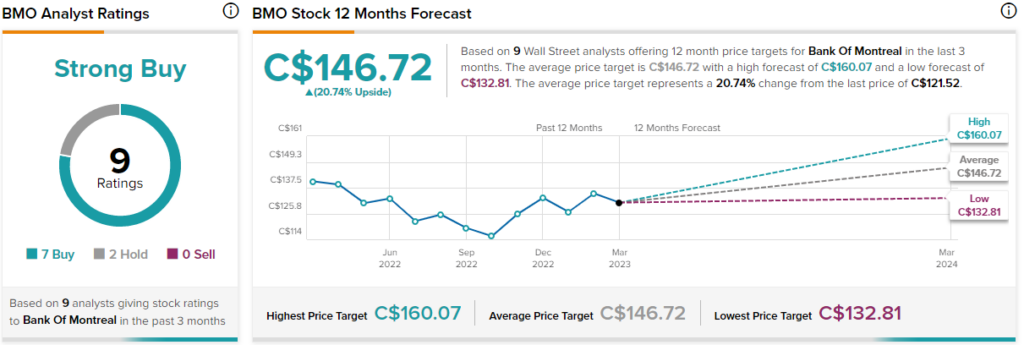Bank of Montreal (TSE:BMO) (NYSE:BMO), also known as BMO, is one of the “Big Five” Canadian banks. Notably, it has a ‘Perfect 10’ Smart Score rating on TipRanks, meaning it’s likely to outperform the market from here. The rating comes from the positive statistics shown in the image below.

However, its Smart Score can be justified in other ways as well. BMO is consistently profitable, and being one of Canada’s biggest banks gives it a competitive advantage. The company has paid dividends since 1829 (and hasn’t missed any payments), making it a reliable long-term holding. Further, the stock is undervalued and is likely to keep performing well over the long term as it creates more value for shareholders. Let’s dive in.
BMO’s Dividend History is Stellar
As mentioned above, BMO has been paying dividends non-stop for almost 200 years. Obviously, not many dividend stocks can match this. Over the past five years, BMO’s dividend per share has grown at a compound annual growth rate (CAGR) of about 9%, which is a good growth rate considering how mature the company is. Further, its dividend yield is already juicy, at 4.7%, and its payout ratio hovers around 44%, meaning its dividend is well-covered and has much more room for growth.
BMO Stock is Undervalued
To show that BMO stock is undervalued, we will use the excess returns model, which is more appropriate for financial companies because they tend to have volatile free cash flows.
As a result, trying to create forecasts for them doesn’t work well. The excess returns model allows us to use historical numbers instead, which are tangible. There are a few steps to follow for this valuation method.
First, you calculate a company’s excess return, meaning the spread between its return on equity (ROE) and its cost of equity; a higher ROE than the cost of equity is a good thing. Next, you calculate its terminal value. Add them up, and you get your valuation. Here’s the formula:
- Excess Return = (Average ROE – Cost of Equity) x Book Value Per Share
- Terminal Value = Excess Return / (Cost of Equity – Growth Rate)
- Fair Value = Book Value Per Share + Terminal Value
We will use the following assumptions for our calculations:
Average return on equity (ROE): 14.3% (five-year average)
Cost of equity: 10.3%
Book value per share: C$101.81
Growth rate: 2.98% (used 30-year Government of Canada bond yield as a proxy for long-term growth expectations)
Now that we have our assumptions, we’ll plug them into the formula highlighted above. The figures are in Canadian dollars:
- $4.073 = (0.143 – 0.103) x $101.81
- $55.64 = $4.073 / (0.103 – 0.0298)
- $157.45 = $101.81 + $55.64
Therefore, BMO stock is currently worth C$157.45 per this valuation method. Its current share price is C$121.52, making it undervalued.
Is BMO Stock a Buy, According to Analysts?
According to analysts, BMO stock comes in a Strong Buy based on seven Buys and two Holds assigned in the past three months. The average BMO stock price target of C$146.72 implies 20.7% upside potential.

The Takeaway
If you’re looking for great value and reliable dividend income that’s likely to keep growing, then BMO stock is one to consider. The 4.7% yield and consistent profitability can provide you with peace of mind during these uncertain times. Further, analysts expect at least 20% upside potential from here, making the stock attractive.
Questions or Comments about the article? Write to editor@tipranks.com
















